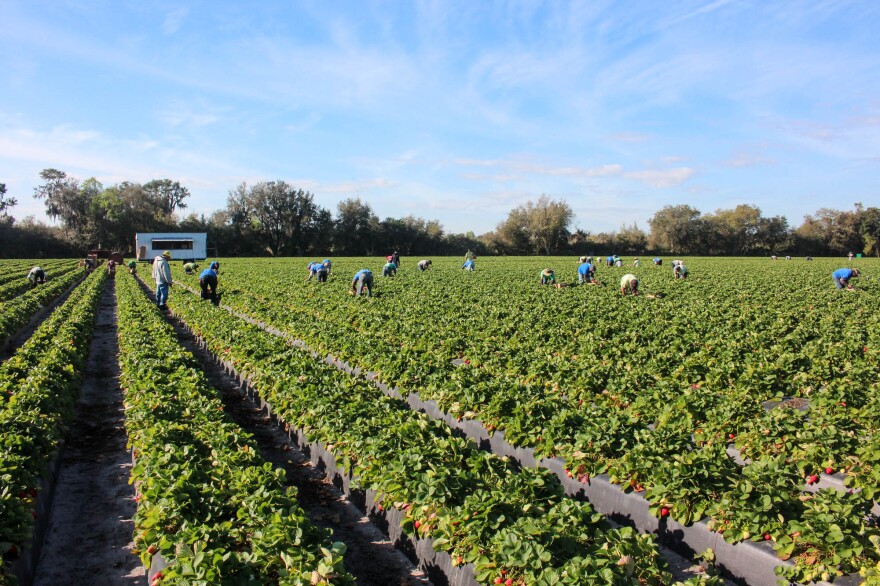Take a look at the next box of strawberries you find in the store. Depending on where in the country you happen to be, it may have come from Florida. But it won't for much longer.
Why?
Come with me to Plant City, the center of Florida's strawberry industry. Meet Carlos Torres, a brawny man with a friendly smile, standing in the early morning sunlight beside a strawberry field. Behind him are long, green rows of ground-hugging berry plants. Dozens of men and women with hats and long sleeves to shield them from the sun move down those rows, picking berries and placing them carefully, red side up, into plastic clamshell boxes, ready for the supermarket. Nobody, and nothing, touches these berries again until someone brings them home from the store.
"It's a lot of bending over all day long," I say, watching the workers.
"All day long," agrees Torres. "All day long. Hard on the back. My props to them. It ain't easy. Not everybody can do it."
Torres works for Foxy, a strawberry grower, and he's a "crew leader." He finds these workers and makes sure they're here every day. But Torres also makes it clear to me that he's on the side of the workers.
"My boss came and told me yesterday, 'Carlos, right now you're probably the only crew leader I know who's got 60 or 70 people out here. Everybody else has 20, 30, 15.' He says, 'I don't know what you're doing, but keep doing it!' "
"So what's your secret?" I ask Torres.
"Treat them good," the crew leader replies. "You treat them real good, with respect and all, and they'll stay with you, and work for you."
This crop, and these workers, have shaped Plant City, the self-proclaimed "Winter Strawberry Capital of the World." Thousands of workers gather here every winter to pick strawberries in huge fields that all lie within about 10 miles of the town.
Gary Wishnatzki's grandfather moved here from New York City in 1929 to grow and ship strawberries. "In those years, there was no other source of winter strawberries," says Wishnatzki, who now owns the family business, Wish Farms.

The Florida season started slowly this year; the weather was too hot. Now, finally, the plants are producing a flood of berries.
But here's the strange part: Florida's strawberry growers already are starting to shut down their bountiful harvest, spraying some fields with herbicides to kill off the plants.
One reason, explains Dustin Grooms, farm manager for Fancy Farms, is that there can be so many berries that farmers don't have enough workers to pick them. The berries get overripe, and then they're worthless. "There's fields right now that they've terminated because they just couldn't keep up," he says.
But there's another reason, too. California.
California has come to dominate the American strawberry business. That coastal climate is practically perfect for strawberries, offering a much longer growing season than Florida. And when California's berries start to hit the market, as they usually do at this time of year, the price drops. At some point, Grooms says, it's no longer profitable to pick these berries.
"There's a magic number, what it takes to pick a strawberry [container]," he says. And when the price goes under that magic number, "there's no need to flood the market with cheap berries."
So right now, as it does every year, Plant City is shifting gears. Growers are thinking about their next crop. Maybe it will be squash, or melons.
And those thousands of strawberry pickers also are getting ready to move on.
I met several of these workers at their children's preschool. It's a special center for the children of migrant workers run by the Redlands Christian Migrant Association (RCMA).

The workers tell me they'll try to find work nearby for a few months until the end of the school year. But compared to picking strawberries, each job won't last as long. Some weeks, there may be no work at all.
Carmelo Zefarina says he'll soon be planting watermelon and cantalopes. "Then we rest maybe a week or two. Then the blueberry picking begins, which lasts like two weeks, until May. And then we pick tomatoes. And then we head north."
Lourdes Villanueva, a former farmworker, now director of farmworker advocacy for the RCMA, says this movement from job to job is like a dance, and you have to move in step with the crops. "If you don't leave when you're supposed to, everything's already taken, so then you have to move farther up north, or to a different crop," she says.
But they usually stick with work that they know. "Most of the workers specialize in certain things. Many people think that you just pick strawberries, you pick oranges, you pick whatever. No! They're very different," she says. "It takes some time to get accustomed to the new crop."
When Villanueva was growing up, her family knocked on farmers' doors to find work. But farms are bigger now, and workers typically deal with middlemen, like crew leaders, or they may follow independent labor contractors who take them from one job to the next.
Bernarda Chavez, her husband and their two children follow their labor contractor from Plant City to North Carolina, and on to Michigan.
And when the weather turns cold up north, they'll be back here in Plant City, picking strawberries.
Copyright 2023 NPR. To see more, visit https://www.npr.org.






